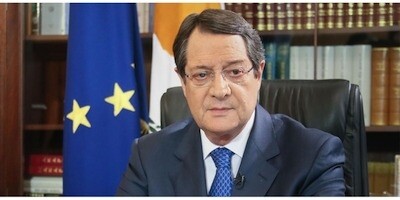Cypriot President Nicos Anastasiades is allegedly holding EU sanctions on Belarus hostage until the EU agrees to expand its blacklist of Turkish nationals involved in illegal energy drilling off Cyprus |
Turkey
Two EU sources informed EUobserver that Cyprus will prevent an EU foreign ministers meeting scheduled for next Monday from imposing an asset freeze and travel bans on 40 Belarusian officials accused of rigging last month’s presidential election or participating in the subsequent crackdown on protests unless the EU also adds a list of names, selected by Cypriot President Nicos Anastasiades, to the existing EU blacklist targeting Turkish nationals involved in ongoing, illegal energy drilling off Cyprus. Although a Cypriot source told EUobserver, “We categorically deny that we have threatened to block the Belarus sanctions unless there is a tough package on Turkey,” a Cypriot diplomat quoted by Reuters declared, “We have no alternative but to act the way we are acting... We have no issues with imposing sanctions on Belarus but we consider that we had a political understanding for both processes to go forward in parallel.” Many European countries, particularly Germany, are wary of alienating Turkey by penalizing it further for illegal drilling in Cypriot waters. Several European diplomats Wednesday warned Cyprus against turning Belarusian sanctions into “a transactional issue” while an EU source described widespread irritation with Nicosia’s strategy and the possibility of blowback.
Qatar
US Deputy Assistant Secretary of State for Gulf Affairs Timothy Lenderking said on a Thursday conference call with reporters, “We’re going to move ahead, we hope, with designating Qatar a major non-NATO ally.” This follows the third US-Qatar Strategic Dialogue last Monday, during which Secretary of State Mike Pompeo thanked Qatar for its “invaluable role in helping stabilize Gaza, as well as regional efforts to de-escalate tensions both in Syria and in Lebanon.” Perks of becoming a major non-NATO ally (MNNA) include eligibility (1) for loans of material, supplies, or equipment for cooperative research, development, testing, or evaluation purposes; (2) as a location for US-owned War Reserve Stockpiles; (3) for consideration to purchase depleted uranium ammunition; (4) for agreements with the US for the cooperative furnishing of training; and (5) for bidding on contracts for maintenance, repair, or overhaul of Defense Department equipment outside the US. Neither the UAE nor Saudi Arabia are designated MNNAs.
Iran
Four sources familiar with the matter stated Thursday that President Trump will sign an executive order in the coming days empowering him to impose secondary sanctions on anyone selling conventional weapons to Iran after the 13-year-old UN arms embargo on the country expires on October 19 according to the terms of the 2015 Iran nuclear deal. Since only the Dominican Republic joined the US in voting for a Security Council resolution last month to extend the embargo, US Special Representative for Venezuela and Iran Elliott Abrams confirmed Wednesday that America would unilaterally impose secondary sanctions to enforce the arms embargo, but did not mention the mechanism for enacting them. Sanctions lawyer Doug Jacobson argues the executive order could be largely symbolic because most prospective offenders are already subject to secondary sanctions.
Lebanon
While addressing an online forum hosted by the American Jewish Committee Thursday, Nathan Sales, the State Department’s coordinator for counter-terrorism, said Hezbollah operatives stockpiled ammonium nitrate in European countries “so it could conduct major terrorist attacks whenever it or its masters in Tehran deemed necessary.” The reckless storage of 2,750 tons of ammonium nitrate at Beirut’s Port is responsible for last month’s blast, which killed at least 220, wounded more than 6,500, displaced 300,000, and caused perhaps $15 billion in direct damage. Sales urged the EU to designate all of Hezbollah as a terrorist group, not just its political wing.
Lebanon’s Maronite Patriarch Bechara al-Rai in an exclusive interview with Arab News Wednesday asserted Lebanon “has no interest in being part of the conflicts and wars in the region” and that “Hezbollah has its own vested interests that are not necessarily aligned with those of Lebanon.” The Patriarch advocated a return to “active neutrality,” which he claims was Lebanon’s policy from independence until “the Cairo Agreement allowed the Palestinians to carry out military operations against Israel from Lebanese territory.”
Yemen
Col. Turki Al Malki, spokesman for the Saudi-led coalition backing Yemen’s internationally recognized government, announced the coalition intercepted and destroyed drones launched by the Iranian-backed Houthi rebels at civilian targets in the kingdom’s southern region of Khamis Mushait. Houthi spokesman Yahya Sarea tweeted that they successfully attacked Saudi Arabia’s Abha International Airport with Samad-3 drones. The Houthi militia has frequently targeted the airport over the past two years with cruise missiles and drones, injuring dozens and killing at least one.
Israel
The Dubai Multi Commodities Center (DMCC), which includes the Dubai Diamond Exchange, signed a collaboration agreement with the Ramat Gan-based Israel Diamond Exchange (IDE) Thursday that entails IDE opening a representative office in Dubai and DMCC opening a sales office in Ramat Gan. In 2019 Israel exported $4.9 billion-worth of polished diamonds while the UAE ranks second globally for diamond re-exports.
Micah Levinson is the Washington, DC Resident Fellow at the Middle East Forum







